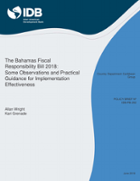The Bahamas Fiscal Responsibility Bill 2018: Some Observations and Practical Guidance for Implementation Effectiveness
Date
Jun 2018
This Policy Brief examines The Bahamas’ Fiscal Responsibility Bill 2018, juxtaposing it against some standard principles that typically guide the formation of a fiscal responsibility framework. Key findings are that The Bahamas’ proposed framework as outlined in the bill are clear, sound, and accord with the typical objectives of a standard fiscal responsibility framework. The embedded fiscal rules appear to be well designed and meet the key requirement test because they will be enshrined in law with an independent oversight fiscal council to monitor and report on compliance and administrative sanctions in cases of breach. Importantly, The Bahamas’ proposed framework strikes a good balance between credibility and flexibility, with built-in escape clauses and mechanisms that support fiscal countercyclicality. Three key lessons are distilled from the experiences of Jamaica and Grenada (the two other independent CARICOM countries with fiscal responsibility laws) that might be useful for The Bahamas: (i) strong public financial management systems are integral for the smooth implementation of the legislation; (ii) public consultations are not only important prior to the design of the framework, but they are also important during its implementation; and (iii) it is important to embed contingency provisions in the framework given The Bahamas’ inherent vulnerability to natural hazards.



